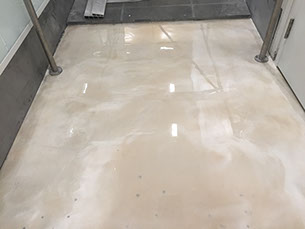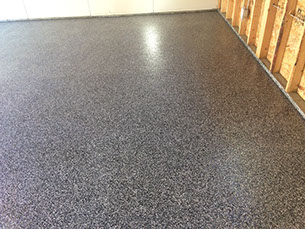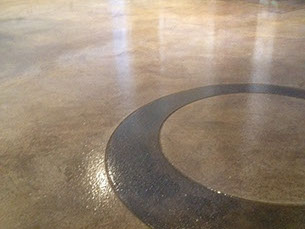Proudly serving Saskatchewan

Epoxy & Sealing Solutions
Epoxy...
Epoxy flooring has long being tied to industrial use for resurfacing and repairs, epoxies popular on high traffic areas because of their longevity, resistance to wear and ease of maintenance. For the last few years we have seen a marked rise in epoxy use on the residential market; with the decorative concrete industry expanding more and more into interior floors, epoxies are finding their way into homes as a choice sealer for acid stained floors and overlays.
Usually, when we think of epoxies we picture thick gooey stuff that is hard to apply and does not provide much UV resistance, that perception is changing rapidly as new developments in the industry have produced new products to accommodate the growing Decorative Concrete Market. To satisfy the needs of the contractor manufacturers have gone to new technologies to provide a higher performance product, Some of the needs the contractor had was for Water Base products, UV resistance epoxies and Low Viscosity - High Solids Epoxies, this new breed of products has made it possible for the decorative concrete contractor to use expand his arsenal of sealers to satisfy the needs of the project owners.
These advances have contributed to the increase in sales of epoxy industry wide, we see more decorative floors sealed with epoxies as well as flake system used on garages through out the country. What make epoxies so attractive? For starters, if you like a high gloss finish on your floors, epoxy is the way to go, they provide shine and depth to any floor in addition to scratch resistance, to most household chemicals, very good traffic wear and many new products are easier to apply.
As with most systems, epoxies do require planning and preparation, to get a floor ready for epoxy involves cleaning and abrading the surface to ensure proper bonding. Though using epoxies may involve a little more work, the results more than compensate for that.
Concrete sealers...
If you have recently completed a project using concrete, you need to seal the surface to prevent water and other seepage. Additionally, some concrete projects will receive an aesthetic "lift" if resealed properly. Whether it is an exposed aggregate pathway, concrete flooring, or a patio, you will want to consider the benefits of sealing your work.
Concrete sealers protect projects that require the material to be impenetrable, or at least, less penetrable than unsealed concrete. Concrete sealers finish concrete floors. Sealers act to prevent damage from traffic, water and chemical agents. Sealers reduce the porosity of concrete and prevent water and dirt from getting into the concrete. Many people use water based sealers indoors (due to smell), and acrylic sealers outside for the harsher conditions.
Types of Concrete Sealers:
Film Formers. Film formers (Gloss sealers) inhibit the penetration of water and impurities by creating a barrier on the concrete's surface. Since many of these film formers create a luster or shine on the surface, they are often used to enhance colored and designed concrete.
Type of Concrete Sealers: Penetrates. Matte or flat sealer penetrates into the concrete. They get 1 to 4 millimeters into the concrete to increase water repellency. Unlike the film formers, they do not leave a sheen or gloss.
Which Type of Concrete Sealer to Use?
This depends on two factors: What do you want the surface to look like and what type of maintenance are you willing to do? If you want a glossy finish, go with the film formers. If you desire a matte finish, use a penetrate. If you need a slip-free surface, stay away from film formers. To keep maintenance manageable, you will need to choose the correct product. For instance, for sealing a driveway, you need a coating that repels grease and oil and prevents water penetration. To make it easier to care for an interior floor, use a coating that dust-proofs the surface and resists scuffs and staining.



Copyright 2020 - Think Concrete Sask